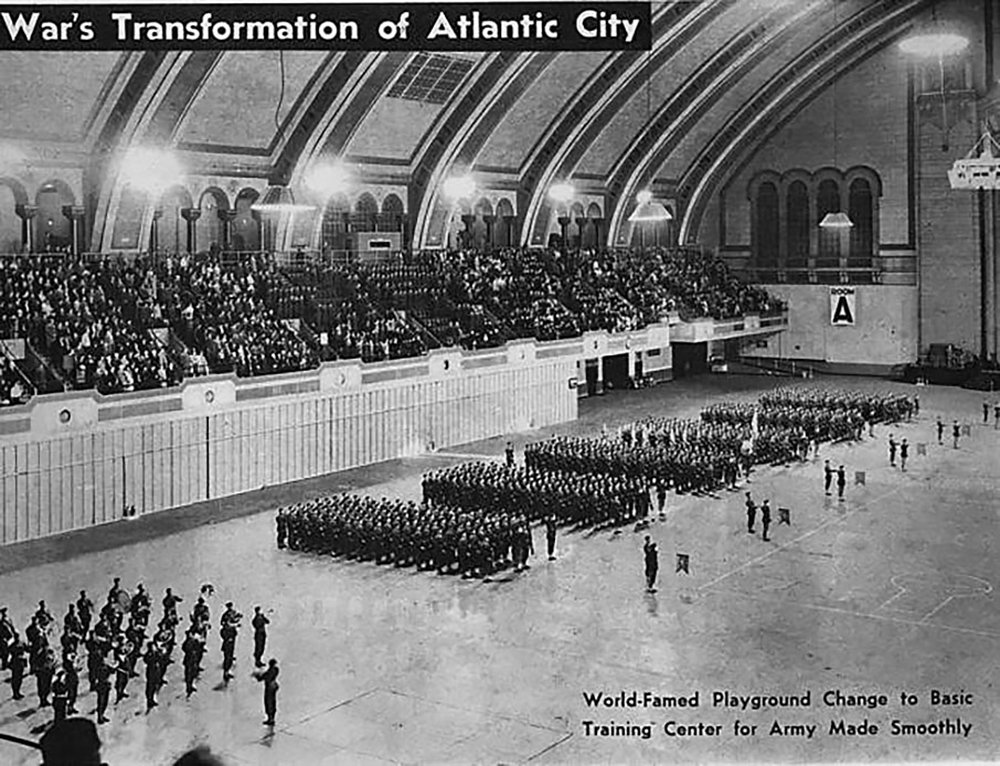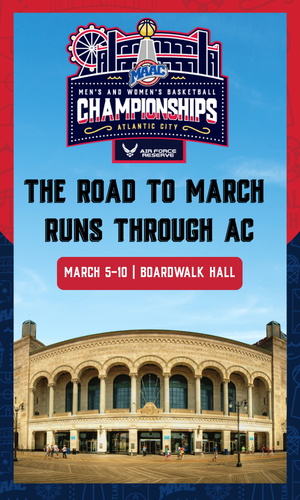By Bruce Klauber
Those of a certain age still call it Convention Hall, although it was renamed Jim Whelan Boardwalk Hall in 1997, in honor of the former mayor. Whatever one calls it, the cavernous facility at 2301 Boardwalk, which opened in 1929, is one of the last remaining structures from Atlantic City’s golden age.
Though rarely used for conventions since the Convention Center opened in 1997, the 10,500-seat venue is still used for concerts, boxing matches and other sporting events. It is perhaps best known for hosting the Miss America Pageant from 1940 through 2004, and again from 2013 through 2019.
The building’s stats were incredible when it opened and remain incredible today. According to its original program, “The barrel ceiling consists of painted aluminum tiles and is decorated to resemble Roman bath tiles. It extends over 196,000 square feet. The building’s forward section is slightly rotated to align with the boardwalk, while the hall itself is aligned to the street grid.”
Its pipe organ is said to be “the world’s largest musical instrument; a pipe organ with over 33,000 pipes, eight chambers, the world’s largest console with seven manuals (keyboards), and over 1,000 stops used to adjust the instrument’s sounds and timbres.”
Some of the events held there have reached legendary status, including the 1964 Democratic Convention, seven Mike Tyson boxing matches, and concerts starring The Beatles, The Rolling Stones, Bruce Springsteen, Celine Dion, The Who, Beyonce, Madonna, Lady Gaga, Britney Spears, and many others. Last April, the hall hosted the Atlantic City Beer Festival featuring Goldfinger, Cliffdiver, Keep Flying, Hot Mulligan, Free Throw and Just Friends.

Other concerts held there through the years include Cher on Dec. 10 of 1999, Luciano Pavarotti and the New Jersey Symphony in June of 1992, a November 1982 show with Kenny Rogers and Larry Gatlin; Ray Charles over the July 4 weekend of 1980; Helen O’Connell and a big band salute on July 12 of 1973, and Barbra Streisand on Aug. 27, 1964.
Two other shows deserve special mention. Still riding high after her April 1961 triumph at Carnegie Hall, Judy Garland performed on Aug. 4 and Aug. 8 of 1961 at Convention Hall. She stayed at The Claridge, where many visiting celebrities of the day stayed. From there, she sold out the Hollywood Bowl, repeating many of the numbers performed in the Carnegie Hall show on Sept. 16.
Frank Sinatra’s first concert in Atlantic City after gambling was legalized was not at Resorts International. Mr. S. performed at Convention Hall on Oct. 29, 1978, to benefit the Atlantic City Medical Center. His last song was “America the Beautiful.” I know. I was there. His first shows at Resorts didn’t take place until the week of April 12, 1979.
It’s unfortunate that complete records of pre-1960s events at the Convention Hall don’t exist. But in the course of doing research for this piece, something quite extraordinary popped up. The Jimmie Lunceford big band, barely remembered today, and one of the most important and influential ensembles to come out of the swing era, performed at Convention Hall.
The Lunceford band was an all-black group best known for its tight section work, top-notch soloists, and a rhythmic feel that influenced countless swing bands. Given that Atlantic City was totally segregated until the 1964 passage of the Civil Right Act, it came as a great surprise to find that the Lunceford band actually played a concert at Convention Hall on Aug. 28, 1941. The band played Atlantic City before and after that date, but those performances took place at Club Paradise, a black nightclub which actually catered to a white clientele.
In addition to boxing, a number of indoor events were held there through the years. Soccer, college football, basketball, ice hockey, wrestling matches, midget car races, the Ice Capades and tennis tournaments all took place at Convention Hall.
The storied venue was, for decades, an essential presentation venue for all kinds of big events on the major arena circuit. Billboard magazine recognized it as the top-grossing mid-sized arena in the U.S. in 2003 and 2004.
Long before it hosted big concerts, Convention Hall, as well as many of the city’s larger hotels, was used to train and house members of the military during World War II.
In a 1992 article in The Philadelphia Inquirer, William H. Sokolic, a Shore Local contributor, wrote, “Convention Hall became a central point for the military, both socially and professionally. The quartermaster had offices in the hall, as did the chaplains and their staff. In May 1942, the city fathers turned the keys to the resort over to the Army.
“The World’s Playground became Camp Boardwalk. You stepped out of a hotel and you were in a military camp. Atlantic City became the only town in the continental United States that was transformed into a military base. Until January of 1946, the resort served first as a basic training center for Army Air Corps and Coast Guard recruits, then as a redistribution center for returning airmen.
“All the hotels were taken over for barracks. Chalfonte-Haddon Hall was named Thomas England General Hospital during the war. It may have seemed like the cushiest spot in the military: beachfront living in some of the ritziest hotels in the country. But the city’s hotels, from the Breakers on Virginia Avenue to the President on Albany Avenue, were stripped of almost all furnishings.
“Instead of beautifully decorated suites, soldiers found bare walls and concrete floors. Standard Army cots replaced soft beds. Each of the major hotels had its own mess hall and PX. Troops bunking in the smaller hotels ate their meals in larger ones such as The Claridge.
“Almost 300,000 soldiers spent time in Atlantic City during the war. Among the more famous were Glenn Miller, Mickey Rooney, Broderick Crawford, Henry Mancini and Donald O’Connor.”
Fortunately for the city and for those who book shows and events, Boardwalk Hall has not been left to deteriorate. A $90 million restoration project took place in 2001. And, as reported by Stephen Klenk in these pages not long ago, the Historic Organ Restoration Committee, with “fewer than a dozen volunteers who graciously provide their skills and services to the organization,” are in the midst of restoring the famed pipe organ.
Boardwalk Hall, was deservedly recognized for its engineering as a Historic Civil Engineering Landmark in 1983, and as a U.S. National Historic Landmark in 1987.
That is as it should be. After all, it all happened here.
Bruce Klauber is the author of four books, an award-winning music journalist, concert and record producer and publicist, producer of the Warner Brothers and Hudson Music “Jazz Legends” film series, and performs both as a drummer and vocalist.











